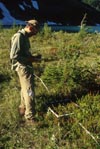| |
|
 |
 |
 |
|
 |
|||
 |
 |
Ecological Consequences of Recreational Use: A Case Study of Trapper
Lake, North Cascades National Park
Wilderness Management / Social Science North Cascades National Park Todd Newburger Huxley College of the Environment Western Washington University, Bellingham, WA Abstract: Protected areas of wilderness are attracting more recreational users each year. Various parks and agencies have applied different methods to manage recreational use. As use increases, many wilderness areas are showing impacts on soils and vegetation. Trapper Lake represents a unique case study in a remote wilderness location that has sustained noticeable recreational impact. Surrounded by steep slopes and accessible only by unmaintained trails, Trapper Lake is currently slated for new management under proposed revisions to the wilderness management plan at North Cascades National Park. This study determines the effects of recreation on the ecological integrity of Trapper Lake Basin through examination of impacts on vegetation cover, species composition and soils. This study aims to determine the effectiveness of using indicators to infer resource condition. Field data have been collected on soil compaction, soil organic layer, soil water infiltration, plant species composition, vegetation height and percent-cover of vegetation. All social trails have been mapped and inventoried within Trapper Lake Inlet. Analysis of air photos will determine the extent of historical changes of social trails and campsites that have occurred in the last thirty years. Considering several factors including topography, elevation, vegetation type, soil type, and amount and types of recreational use, this case study will provide perspectives on many pending management concerns. |
|
|
|
|
|
|
|
|
|
Research & Park Stewardship > Case Studies > Social Science |